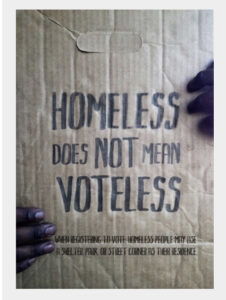
In the upcoming presidential election, citizens of all backgrounds are relying on their ballot more than ever to help shape the political process. Among this group is a percentage of the homeless population who continue to exercise their voting rights.
On any given day, according to the Big Bend Homeless Coalition, more than 700 people are estimated to be homeless in Tallahassee. Stigmas surrounding their conditions often overshadow the fact that more homeless people vote than recognized.
These stereotypes describe the population as lazy, incompetent or indifferent when in fact, many were once established and there are various reasons why homelessness persists.
For Meagan Coloabo and Aaron Stevens, a home address does not define citizenship. However, a lack of stable housing does propose challenges for Coloabo, who has been homeless for almost four years. Still, she believes voting is a step toward change.
“People need to vote because we all have a voice. We need to voice our opinions on what’s going on. I believe that if you stay quiet about what you’re having problems with just like everyone else then nothing’s gonna change. You have to physically do something for things to change,” Coloabo said.
“If more of us, vote, the better it would be. The more Black people who vote, the better it would be for us and I think we would live a lot better,” Stevens added.
With assistance from local homeless shelters and refuge houses in Tallahassee, voting remains available to many similar to Coloabo and Stevens.
In particular, the Kearney Center provides 24-hour holistic services to homeless individuals including meal distribution, medical assistance, temporary shelter and in some cases, voter registration. However, there is only so much aid the Kearney Center and shelters can provide. The idea of voting, for some, is not so simple.
“The places where they vote need to be placed in more Black communities, because that’s who’s not voting. They don’t even know about it a lot of times. It’s the lack of information they receive about it [elections] and the places are so far out from our district it’s kind of hard to go vote even if you wanted to,” said Keith Bythewood, a supervisor at the Kearney Center.
Transportation and scarce resources are among the largest deterrents the population faces aside from their daily struggles.
“The wishful thought that maybe something could happen is probably the main reason why people still go vote,” Bythewood said.